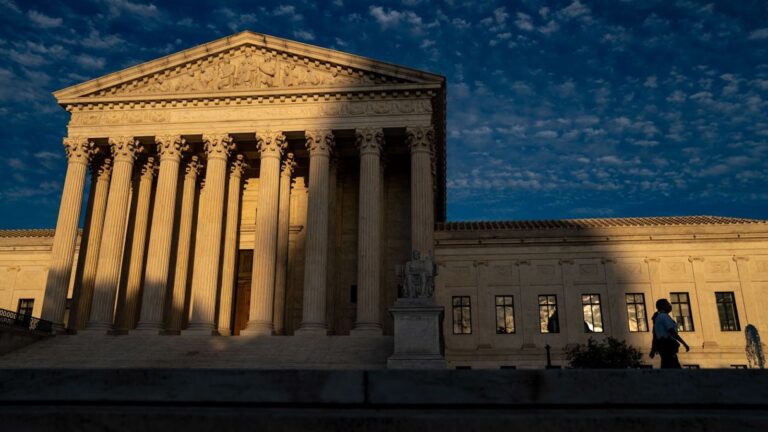The Supreme Court is Still a Serious Institution
After the Supreme Court struck down Affirmative Action this past term, Chris Hayes of MSNBC tweeted, “In these big cases, it’s never more clear that SCOTUS justices are just bloggers with a law library and law clerks. They’re really just slinging takes.” Critics of the court, like Hayes and many on the left, say that the conservative majority is only deciding cases based on their political preferences and not on the law.
Is this skepticism merited?
Of this year’s term, only three of the decisions included a 6-3 majority, which were arguably the most controversial. 50% of this term’s decisions were unanimous and 89% included a liberal justice.
The Court’s conservative majority has overturned precedents that were championed by the left: Roe v. Wade and Affirmative Action. This has provoked left-wing accusations that the Court is power-mongering for the Right. A recent Gallup poll showed that the Court’s approval came at a new low, indicating that Americans are losing confidence in the institution.
Based on those two cases alone, one would assume that the Roberts Court has overturned lots of precedents, but in reality, the Roberts Court has overturned fewer precedents than other courts of the last 80 years. Americans can have confidence—the Court is still guided by the US Constitution.
Justice Antonin Scalia once said that without the Constitution, the United States would be just like any country with a Bill of Rights. The Court functions to check laws to determine if they’re constitutional or not similar to how an umpire in a baseball game calls balls and strikes, an analogy espoused by Justice Roberts. If the Court were to disregard their constitutional function, not only would it sow deep doubt among the public, but our Constitution would also be pointless.
If the Court is fulfilling its constitutional function by keeping both branches in check, how is it an illegitimate institution? Let’s look at Biden’s proposal to cancel student loan debt. If Democrats want to cancel student loan debt, they could attempt to pass a law through Congress. Congress, in this case, is not only the most appropriate institution for this kind of massive policy change, but Congress specifically has the power of the purse.
Instead, the Biden Administration decided the best way to cancel student loan debt was to circumvent Congress and attempt to do it through executive action. The Court believed that Biden’s executive action was potentially unconstitutional and opted to hear the case and decided accordingly. In a sense, they were reminding the country that Congress is the one that needs to pass this law, not the President or the Court.
What makes many on the left concerned about the Supreme Court are the outcomes it’s producing. The Court is often like a pendulum swing: Sometimes it rules one way and sometimes it will rule another. It can get confusing and even frustrating, but this isn’t because of political preference, it’s because the law isn’t always black and white. When facts of a case are applied to the law, things may change.
The Court may even get some things wrong and may have to correct them. Unlike Congress or even the Presidency, the Court was never meant to be an outcome-based institution because it was never meant to be politically influenced in the first place. In other words, the Court is going to make decisions that make both Republicans and Democrats angry.
Some of this term’s rulings were applauded by the left, such as the Court rejecting the state legislature independent theory and upholding a federal law that ensured Native American children were adopted by Native American families, among others. I remember when the Court ruled to uphold Obamacare. Conservatives were deeply concerned, but instead of attacking the court’s legitimacy, the right worked hard to place qualified justices and judges to uphold the Constitution and find other ways their policy preferences could be enacted outside of the Supreme Court.
The Supreme Court is one of our country’s last trusted and cherished institutions. It needs to remain that way. However much we may disagree with the Supreme Court’s rulings, the Justices aren’t a bunch of bloggers with law clerks and a law library. The Supreme Court remains a serious institution.














This court’s Progressive critics are wrong as always. But disrespect of this court’s constitutionalism is required.
Supreme courts have always been political institutions. Their Progressive leanings have always been in the direction of unduly depriving persons of life, liberty, or property. This was true on the early national banks and on slavery, then on legal tender, then on the administrative state, then on wars too, and even most recently on abortion. Judges’ opinions are only opinions, should be summarily not enforced by executives who independently interpret the Constitution and disagree, and should be summarily disregarded by legislators who independently interpret the Constitution and disagree.
Judges deserve as much respect as their opinions deserve, and no more. The current supreme court has basically two constitutionalists, even though these two both failed too on abortion, and typically a third constitutionalist on any given issue; three milquetoast Progressives on any given issue; and three absolute Progressives on all issues.
Among the few judges who are fully meriting respect on constitutional matters lately are the speech-respecting judges who are involved in Missouri v. Biden.
Oh, and the so-called power of the purse? Legislators can constitutionally enact an overall topline figure for appropriations, but legislators can’t constitutionally enact executive allocations of line-item budgets. The article I, II, III structure is far-more fundamental than a mere appropriations clause, and therefore takes precedence.